2017-2018学年沪教版初中英语八年级下册英语期末知识点汇总
沪教版英语八下英语单词表
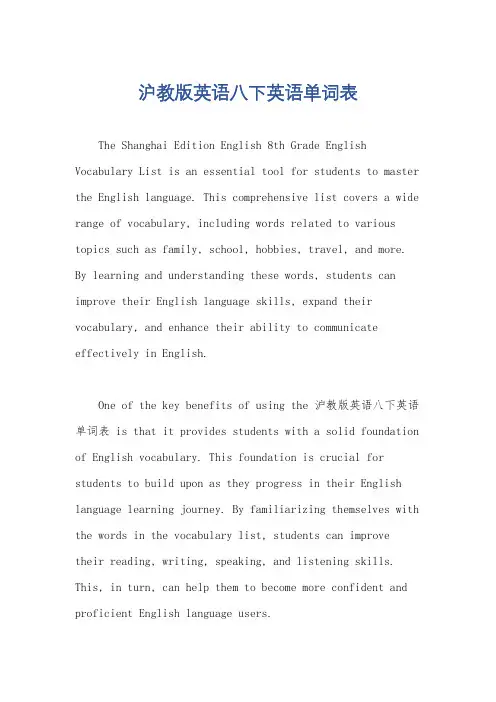
沪教版英语八下英语单词表The Shanghai Edition English 8th Grade English Vocabulary List is an essential tool for students to master the English language. This comprehensive list covers a wide range of vocabulary, including words related to various topics such as family, school, hobbies, travel, and more. By learning and understanding these words, students can improve their English language skills, expand their vocabulary, and enhance their ability to communicate effectively in English.One of the key benefits of using the 沪教版英语八下英语单词表 is that it provides students with a solid foundation of English vocabulary. This foundation is crucial for students to build upon as they progress in their English language learning journey. By familiarizing themselves with the words in the vocabulary list, students can improvetheir reading, writing, speaking, and listening skills. This, in turn, can help them to become more confident and proficient English language users.Moreover, the vocabulary list is designed to help students expand their knowledge of English words and their meanings. By studying the words in the list, students can gain a deeper understanding of the English language and its nuances. This can be particularly beneficial for students who are non-native English speakers, as it can help them to grasp the subtleties of the language and improve their overall language proficiency.In addition, the 沪教版英语八下英语单词表 can also serve as a valuable resource for teachers. Educators can use the vocabulary list to design lesson plans, create vocabulary-building exercises, and assess students' language skills. By incorporating the words from the list into their teaching materials, teachers can help students to develop a strong command of the English language and achieve academic success.Furthermore, the vocabulary list can be a useful tool for students who are preparing for English language proficiency exams, such as the TOEFL or IELTS. By masteringthe words in the list, students can improve their chances of scoring well on these exams and gain access to educational and professional opportunities that require a high level of English language proficiency.Overall, the 沪教版英语八下英语单词表 is an invaluable resource for students and educators alike. By studying the words in the list, students can enhance their English language skills, expand their vocabulary, and improve their overall language proficiency. This, in turn, can help them to succeed academically and professionally, and become confident and effective communicators in the English language.。
上海牛津沪教版八年级(下)同步讲义unit2
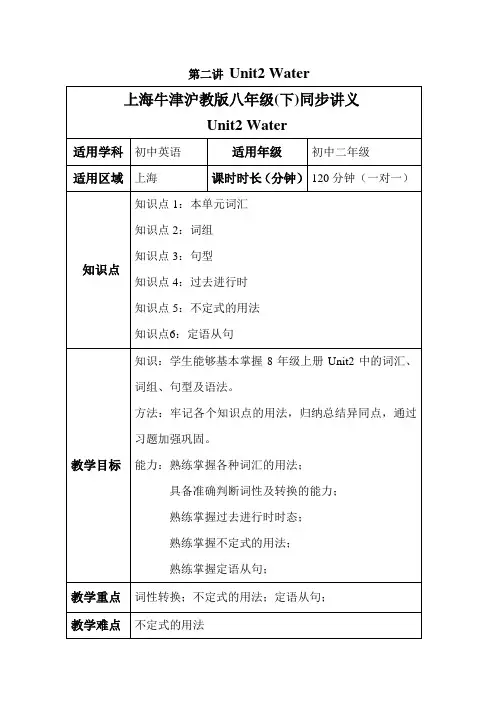
第二讲Unit2 Water教学过程一、课堂导入教师讲述一个与本节课题目有关的英文小故事,引出今日所要讲解的知识点,然后让学生简单梳理一下所涉及的问题,带着问题学习本节课的内容。
二、复习预习教师引导学生复习上节课学的重点内容,检测单词的用法,(以提问、回顾的形式进行),针对上节课的作业进行讲评、订正、答疑,并通过英文小故事导入本节课所要学习的新知识。
三、知识讲解1. 知识点一:重点单词1)daily [ˈdeɪli]【词性】adv.【词义】每天【经典例句】Your body needs about two litres of water daily.你的身体每天需要两升左右的水。
2)amount [əˈmaʊnt]【词性】n.【词义】数量;数额【易混淆点】an amount of 大量的,修饰不可数名词a number of 大量的,修饰可数名词【经典例句】When you exercise, the amount of water you need increase.当你锻炼的时候,你身体需要水的量就增加了。
3)increase [ɪnˈkri:s]【词性】v.【词义】增加【易混淆点】increase 增加decrease 减少【经典例句】When you exercise, the amount of water you need increase.当你锻炼的时候,你身体需要水的量就增加了。
4)remain [rɪˈmeɪn]【词性】v.【词义】仍然是;保持不变【易混淆点】remain 仍然是still 仍然;依旧【经典例句】The amount of water you need remains the same.你需要的水还是一样的。
5)symbol [ˈsɪmbl]【词性】n.【词义】符号【易混淆点】symbol 符号signal 标记【经典例句】The chemical symbol for water is H2O.水的化学分子式是H2O。
沪教版初中英语知识点
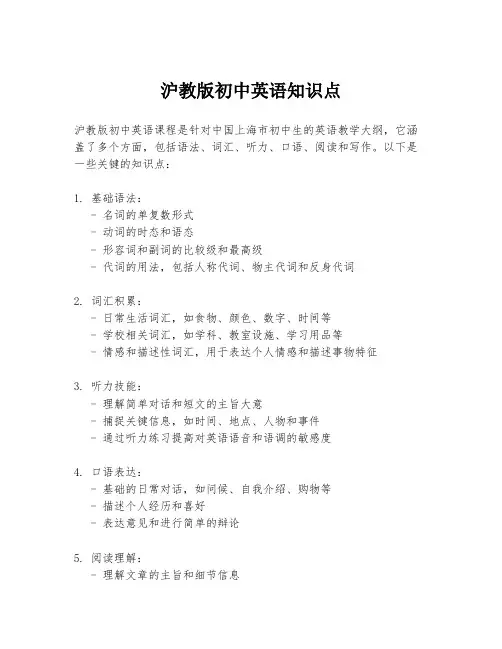
沪教版初中英语知识点沪教版初中英语课程是针对中国上海市初中生的英语教学大纲,它涵盖了多个方面,包括语法、词汇、听力、口语、阅读和写作。
以下是一些关键的知识点:1. 基础语法:- 名词的单复数形式- 动词的时态和语态- 形容词和副词的比较级和最高级- 代词的用法,包括人称代词、物主代词和反身代词2. 词汇积累:- 日常生活词汇,如食物、颜色、数字、时间等- 学校相关词汇,如学科、教室设施、学习用品等- 情感和描述性词汇,用于表达个人情感和描述事物特征3. 听力技能:- 理解简单对话和短文的主旨大意- 捕捉关键信息,如时间、地点、人物和事件- 通过听力练习提高对英语语音和语调的敏感度4. 口语表达:- 基础的日常对话,如问候、自我介绍、购物等- 描述个人经历和喜好- 表达意见和进行简单的辩论5. 阅读理解:- 理解文章的主旨和细节信息- 推断词义和作者意图- 分析文章结构和逻辑关系6. 写作技巧:- 写作简单的句子和段落- 描述事物、事件和经历- 写信和电子邮件,表达感谢、邀请或请求7. 文化意识:- 了解英语国家的文化习俗和节日- 学习英语国家的历史和地理知识- 通过文化学习提高跨文化交流能力8. 学习策略:- 制定有效的学习计划和目标- 使用不同的学习方法,如通过歌曲、游戏和角色扮演学习英语 - 培养自主学习和合作学习的能力9. 考试技巧:- 熟悉各种题型和考试格式- 掌握答题技巧和时间管理- 通过模拟考试提高应试能力沪教版初中英语课程注重学生英语综合运用能力的培养,通过多样化的教学方法和丰富的教学资源,帮助学生打下坚实的英语基础,并激发他们对英语学习的兴趣。
沪教版初中英语八年级下册Unit 7单词知识点梳理
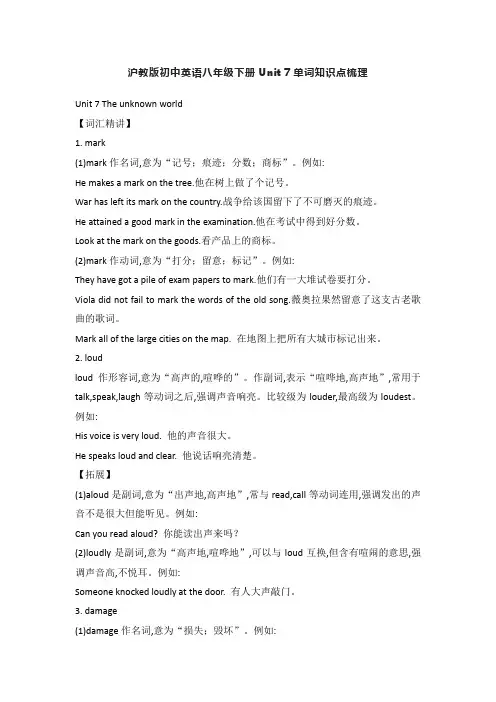
沪教版初中英语八年级下册Unit 7单词知识点梳理Unit 7 The unknown world【词汇精讲】1. mark(1)mark作名词,意为“记号;痕迹;分数;商标”。
例如:He makes a mark on the tree.他在树上做了个记号。
War has left its mark on the country.战争给该国留下了不可磨灭的痕迹。
He attained a good mark in the examination.他在考试中得到好分数。
Look at the mark on the goods.看产品上的商标。
(2)mark作动词,意为“打分;留意;标记”。
例如:They have got a pile of exam papers to mark.他们有一大堆试卷要打分。
Viola did not fail to mark the words of the old song.薇奥拉果然留意了这支古老歌曲的歌词。
Mark all of the large cities on the map. 在地图上把所有大城市标记出来。
2. loudloud作形容词,意为“高声的,喧哗的”。
作副词,表示“喧哗地,高声地”,常用于talk,speak,laugh等动词之后,强调声音响亮。
比较级为louder,最高级为loudest。
例如:His voice is very loud. 他的声音很大。
He speaks loud and clear. 他说话响亮清楚。
【拓展】(1)aloud是副词,意为“出声地,高声地”,常与read,call等动词连用,强调发出的声音不是很大但能听见。
例如:Can you read aloud? 你能读出声来吗?(2)loudly是副词,意为“高声地,喧哗地”,可以与loud互换,但含有喧闹的意思,强调声音高,不悦耳。
例如:Someone knocked loudly at the door. 有人大声敲门。
沪教牛津版初中英语八年级下册Unit 7知识点梳理
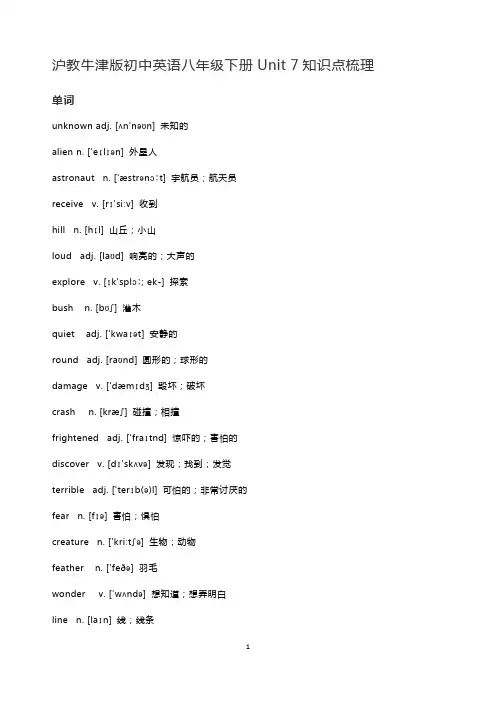
沪教牛津版初中英语八年级下册Unit 7知识点梳理单词unknown adj. [ʌn'nəʊn] 未知的alien n. ['eɪlɪən] 外星人astronaut n. ['æstrənɔːt] 宇航员;航天员receive v. [rɪ'siːv] 收到hill n. [hɪl] 山丘;小山loud adj. [laʊd] 响亮的;大声的explore v. [ɪk'splɔː; ek-] 探索bush n. [bʊʃ] 灌木quiet adj. ['kwaɪət] 安静的round adj. [raʊnd] 圆形的;球形的damage v. ['dæmɪdʒ] 毁坏;破坏crash n. [kræʃ] 碰撞;相撞frightened adj. ['fraɪtnd] 惊吓的;害怕的discover v. [dɪ'skʌvə] 发现;找到;发觉terrible adj. ['terɪb(ə)l] 可怕的;非常讨厌的fear n. [fɪə] 害怕;惧怕creature n. ['kriːtʃə] 生物;动物feather n. ['feðə] 羽毛wonder v. ['wʌndə] 想知道;想弄明白line n. [laɪn] 线;线条refuse v. [rɪ'fjuːz] 拒绝spread v. [spred] (spread, spread) 张开mark n. [mɑːk] 符号desert n. ['dezət; dɪ'zɜːt] 沙漠;荒漠tent n. [tent] 帐篷knife n. [naɪf] 小刀explain v. [ɪk'spleɪn] 解释;说明pleased adj. [pliːzd] 高兴;满意;愉快keep quiet 保持安静because of 因为in fear 恐惧地;害怕地landing site 降落场as soon as possible 尽快agree with 同意;赞成disagree with 不同意;持不同意见;有分歧Unit7课文Aliens arrive!外星人到来!Tina woke up at midnight. She looked out of her window and saw a yellow light in the sky.蒂娜在午夜醒来。
沪教版初中英语单词汇总(分册、分单元)
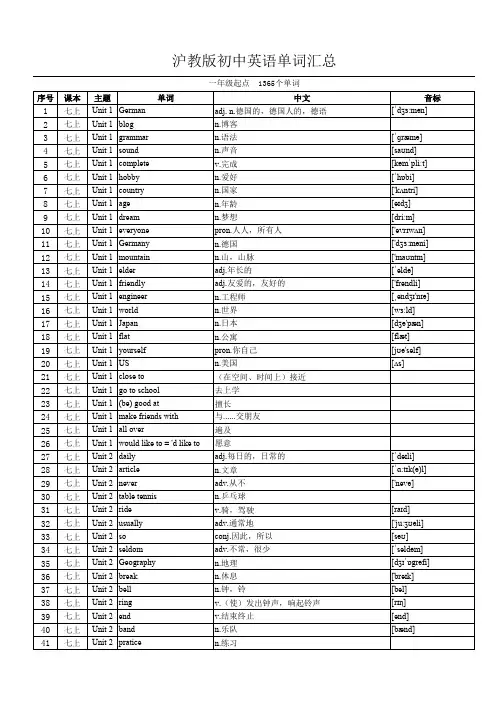
中文 n.镇 v.吹 pron.所有事物,一切 n.旅行 v.照耀 adv.明亮地 n.野餐 adj.干的,干燥的 adj.下雪多的 v.花(时间),度过 n.亲戚,亲属 prep.在...期间 n.祖父(母),外祖父(母) n.小包装纸袋 去旅行 去野餐 堆雪人 放风筝 野餐 n.日记,日记簿 n.太空 n.宇宙飞船 n.宇航服 adj.紧张的 v.离开 n.重力,地球引力 adj.能,能够 v.漂浮,浮动 v.系,捆,绑 pron.我们自己 prep.没有,缺乏 adj.虚弱的,无力的 v.呼吸 conj.如果 n.照相机 v.运转,运行 n.花园 n.岩石 n.明信片 n.机器 v.返回 多于 能够 不得不,必须
[ˈdeɪli] [ˈɑːtɪk(ə)l] ['nevə]
[raɪd] ['juːʒʊəli] [səʊ] [ˈseldəm] [dʒɪˈɒgrəfi] [breɪk] [bel] [rɪŋ] [end] [bænd]
序号 课本 主题
单词
42 七上 Unit 2 together
43 七上 Unit 2 market
144 七上 Unit 6 just
145 七上 Unit 6 across
146 七上 Unit 6 light
147 七上 Unit 6 direction
148 七上 Unit 6 natural
149 七上 Unit 6 beauty
150 七上 Unit 6 bridge
151 七上 Unit 6 pond
['nɜːvəs] [liːv] [ˈɡrævɪti] ['eɪbl] [fləʊt] [taɪ] [ˌaʊə'selvz] [wɪ'ðaʊt] [wiːk] [briːð] [ɪf] ['kæmərə] [wɜːk] ['gɑːdn] [rɒk] ['pəʊstˌkɑːd] [mə'ʃiːn] [rɪ'tɜːn] [mɔː//ðæn]
上海牛津沪教版八年级(下)同步课件unit4
第四讲Unit4 newspapers教学过程一、课堂导入教师讲述一个与本节课题目有关的英文小故事,引出今日所要讲解的知识点,然后让学生简单梳理一下所涉及的问题,带着问题学习本节课的内容。
二、复习预习教师引导学生复习上节课学的重点内容,检测单词的用法,(以提问、回顾的形式进行),针对上节课的作业进行讲评、订正、答疑,并通过英文小故事导入本节课所要学习的新知识。
三、知识讲解1、知识点一:重点单词1)publish[pʌblɪʃ]【词性】v【词义】出版;发表2)hold [həʊld]【词性】v【词义】举行【经典例句】They held a meeting.他们举行了一个会议。
3)elect [ɪˈlekt]【词性】v【词义】选举;挑出,挑选;决定【易混淆点】choose, select, electchoose 含有运用判断力在一些人、物或行为方式中选出一个的意思:e.g. choose any one you like任你选一个你喜欢的select 侧重于从许多不同种类中进行选择时的挑剔态度:e.g. Four skiers will be selected to represent each country.每个国家将选出四名滑雪者作为代表。
elect 强烈地暗示着通常在两者之间作出挑选时的深思细想:e.g. I elected not to go.我决定不去。
【经典例句】We elected Joyce to be the chief editor.我们选举Joyce 成为总编辑。
4)chief [tʃi:f]【词性】adj.【词义】最重要的;主要的【易混淆点】chief, main两者均可用作形容词,意为“主要的”、“首要的”,注意以下用法:①两者通常都只用作定语,一般不用作表语,有时可互换。
e.g. the chief [main] task主要任务e.g. the chief [main] problem 主要问题② 用于人时,通常用chief而不用main。
八年级沪教版英语知识点
八年级沪教版英语知识点随着初中阶段的逐步深入,八年级沪教版英语知识点也变得越来越复杂,考试内容也更加丰富多彩。
在学习英语的过程中,对于掌握八年级沪教版英语知识点非常重要。
本文将会为大家详细介绍八年级沪教版英语常用知识点,帮助大家成功掌握英语的技巧和方法。
一、动词时态在初中英语学习过程中,动词时态是一个非常重要的知识点。
八年级沪教版英语中,常见的动词时态有一般现在时、一般过去时、一般将来时、现在进行时、过去进行时、过去将来时等。
在考试中,掌握动词时态可以提高做题效率,避免出现低级错误。
二、名词变化中学英语中,名词的变化非常复杂,需要大量练习和记忆。
八年级沪教版英语中,常见的名词变化规则包括单数变复数、可数名词变不可数名词、不可数名词变可数名词等。
同时,还需要注意一些特殊的名词变化规则,如man变men,woman变women等。
三、形容词和副词的用法在八年级沪教版英语中,形容词和副词的用法也是一个很重要的知识点。
在初中阶段,我们通常需要理解形容词修饰名词的规则,并学会使用比较级和最高级进行修饰。
同时,还需要掌握副词修饰动词、形容词和副词的用法,以及不同副词之间的比较规则。
四、句子结构和语法在八年级沪教版英语中,句子结构和语法也非常重要。
学习句子结构和语法,可以帮助我们正确使用各种语法规则,从而减少语法错误的出现。
在学习中,需要了解简单句、并列句、复合句等句型的构成规则,以及一些关键词的用法,如if、unless、because等。
五、谓语动词和宾语在八年级沪教版英语中,谓语动词和宾语也是一个重要的知识点。
谓语动词和宾语是句子中非常重要的组成部分,帮助我们表达出正确的意思。
在学习中,需要了解谓语动词和宾语的用法,如及物动词、不及物动词、及物动词和宾语的搭配规则等。
六、冠词和代词的应用在八年级沪教版英语中,冠词和代词也是一个非常重要的知识点。
冠词和代词的用法在英语中非常常见,因此,学习这两个知识点对于英语的学习非常有帮助。
沪教牛津版初中英语八年级下册Unit 4知识点梳理
沪教牛津版初中英语八年级下册Unit 4知识点梳理Unit4课文Jason is learning how to make cartoons. He has found some information in a magazine.詹森正在学习怎样制作卡通片。
他已经在一本杂志中找到了一些信息。
How to make a cartoon?怎样制作一个卡通片?First, you need to decide on some basic ideas for a story.首先,你需要为一个故事确定一些基本信息。
This story is about a robot, Han. He always forgets things.这是一个关于机器人——韩的故事。
他总是忘记事情。
One day, Han meets his friends Sarah and Tim at the underground station.一天,韩在地铁站遇见了他的朋友莎拉和蒂姆。
He says, "I'm happy. I bought a new notebook. Now I won't forget things."他说:“我感到开心。
我买了一本新书。
现在我不会忘记事情了。
”Sarah says, "yes. I have one too. Here it is."莎拉说:“是的,我也有一本,在这呢。
”Tim asks, "Where's your, Han?"蒂姆问:“你的书在哪里,韩?”Han says, "Oh, no! I forgot to bring it!"韩说:“噢,不!我忘记带了!”In the second stage, think about the kinds of characters you want and what they will look like.在第二个阶段,思考下你想要的各种人物性格以及他们的样子。
深圳沪教版初中英语八年级下课文+知识点
Unit1Helping those in need Voluntary workThree teenagers offered to do some voluntary work during the school holidays.They wrote the following reports.BettyI did some voluntary work in a children's hospital.The children there all suffer from serious illness.We organized a painting competition for them.I met a girl called Cindy.She wanted to paint a picture of the park near her home.I went there and took some photos of it.Cindy used them for her painting.MarkThere are many children without parents.I met some of these children with my mother.We taught them to tell stories.This helps them express their feelings.One child said,"My friends don't understand my pain".We spent some time with a girl called Vivian.Her parents died in a car accident,and she is unhappy and very lonely.She needs friendship.My mother and I willcontinue to visit Vivian.AnnieI wanted to help disabled children.They or moving.I taught them to sing because peace.I met a boy called Tim.He hurt his legs in an accident,but he has lots of courage.We need to help children like Tim and raise their spirits.I will continue to do voluntary work in the future.1.in need 需要帮助的2.voluntary work 志愿服务工作3.talk about 谈论4.write a letter to sb.给某人写信5.ask permission 报请批准6.give sb.a hand 帮助某人7.suffer from 因...受苦;受折磨8.raise one's spirts 使振奋;使鼓起勇气9.have difficulty (in)doing sth..做某事有困难10.in good/bad health 身体健康/不好11.so that 以便,为了12.in hospital 生病住院13.in order to 目的在于,为了14.since then 从那时起15.pay for 支付16.listen for 留心听e...for.把...用于......考点1permission n.准许/批准(不可数名词)拓展:v.permit允许;准许;使有可能ask permission to do sth 征得同意做某事ask permission 报请批准permit sb to do 允许某人做......考点2raise vt.筹募、增加、提高raise money for...为......筹钱They are raising money for the people who lost homes in the earthquake.他们正在为那些在地震中失去家园的人筹钱。
- 1、下载文档前请自行甄别文档内容的完整性,平台不提供额外的编辑、内容补充、找答案等附加服务。
- 2、"仅部分预览"的文档,不可在线预览部分如存在完整性等问题,可反馈申请退款(可完整预览的文档不适用该条件!)。
- 3、如文档侵犯您的权益,请联系客服反馈,我们会尽快为您处理(人工客服工作时间:9:00-18:30)。
2017-2018学年沪教版初中英语八年级下册英语期末知识点汇总U1 复习提纲一、短语1. 在……岁时at the age of2. 代替in place of/ instead of3. 付出代价at a price4. 为某事感激某人be grateful/thankful to sb for sth5. 电视播放的on television6. 对某人要求严格be strict with sb7. 上钢琴课take/have piano lessons8. 病倒fall ill9. 对……负责be responsible for10. 从那时起from then on11. 放弃give up12. 我们时代的 of our time(s)13. 获得奖项win/get/receive an award (for sth.)14. 玩得开心have fun15. 获得一个机会get a chance16. 表演,演出 give a performance17. 例如 such as18. 在许多大型活动at many huge events19. 鼓励某人做某事encourage sb to do sth20. 西方古典音乐Western classical music21. 钢琴天才piano prodigy22. 对……感到好奇be curious about23. an experiment on … 关于…的实验24. 找寻、思索search for25. 使发生;导致lead to (led pt.)26. 厌倦;厌烦(做某事)be tired of doing sth27. 保护……以免…… protect…from sth28. 被称为……;被称作…… be known as…29. 因…为人所知be known for30. 在他的一生中during his lifetime31. 使某人/某物怎样make sth./sb. + adj.32. 建立;创建set up33. 总是、一直is/ was always doing34. 同时at the same time35. 了解learn about36. 出生在某地be born in 37. 与…无关have nothing to do with38. 意味着做某事meaning doing sth39. 打算做某事mean to do40. 在做……方面有天赋have a gift for doing sth41. 坚持做……keep doing sth.42. 出于热爱for love43. 不再想某人;不再把某人放在心上forget about sb44. 得了吧come on45. 储蓄;攒钱save up46. 靠某人自己on one’s own47. 帮助某人give sb a hand48. 共同的,共有的in common49. 与……平等be equal to50. 足够……以至于能够做某事be adj. enough(for sb) to do…51. 太…以至于不能做某事be+ too+ adj.+ to do sth.52. 对……产生兴趣become interested in53. 总计;总数in total=in all54. 历史上in history55. ……方面的专家an expert on/at/in…56. 为……而战fight for…57. 为反对……而战fight against…58. 提供帮助offer to help59. 被认为是……be regarded as…60. 从……退休retire from…二、词汇responsibility (n.) -- responsible (adj.)piano (n.) -- pianist (n.)prodigious (adj.) -- prodigy (n.)stun (n.) -- stunning (adj.)west (n.) -- western (adj.)classic (n.) -- classical (adj.)music (n.) -- musical (adj.)compete (v.) -- competition (n.)succeed (v.) -- success (n.) -- successful (adj.)sudden (adj.) -- suddenly (adv.)perform (v.) -- performance (n.)encouragement (n.) -- encourage (v.)talent (n.) -- talented (adj.)invent (v.) -- inventor (n.) -- invention (n.)curiosity (n.) -- curious (adj.)nature (n.) -- natural (adj.) -- naturally (adv.)improve (v.) -- improvement (n.)science (n.) -- scientist (n.)equip (v.) -- equipment (n.)find (v.) -- finding (n.)actual (adj.) -- actually (adv.)develop (v.) -- development (n.)efficiency (n.) -- efficient (adj.)include (v.) -- including (prep.)pave (v.) -- pavement (n.)manage (v.) -- manager (n.)intelligence (n.) -- intelligent (adj.)confidence (n.) -- confident (adj.)bravery (n.) -- brave (adj.)determine (v.) -- determined (adj.)design (v.) -- designer (n.)三、语法1. I couldn’t agree more. 我再同意不过了。
2. include & including3. the number of &a number of:4. win & beatbeat=defeat 的宾语是人或队伍, 表示“打败……”;win 的宾语不能是人,而是奖金,奖杯,比赛,战争等,如win an award, win the competition。
5. 过去进行时"构成:was / were + doing 用法:过去某个时间正在进行或发生的动作"常与过去进行时连用的时间状语:at ten o’clock last night,then, this time yesterday, at that time,from 8 to 9 last Wednesday…" When,while?过去进行时常与when, while引导的时间状语从句连用,意思是"当……之时"。
when后面既可跟延续性动词,也可跟瞬间动词,常用过去式while后面一般跟延续性动词,常用进行时;强调两个动作同时发生,或表示对比时只能用while" The telephone rang when(while) I was taking a bath. " All the students were sleeping soundly when the fire broke out. (此句中不可以用while) " Father was preparing a report while I was playing games.Unit 2复习提纲一、词形转换1. fun (adj.) funny2. succeed (n.) success, (adj.) successful3. amuse (n.) amusement4. own (n.) owner5. sleep (adj.) asleep, sleepy6. angry (n.) anger7. happy (n.) happiness (opp)unhappy8. express (n.) expression9. art (n.) artist10. delight (adj.) delighted11. splendid (adv.) splendidly12. possible (adv.) possibly13. complain (n.) complaint14. wonder (adj.) wonderful15. bore (adj.) boring, bored16. frighten (adj.) frightened17. worry (adj.) worried18. close (adj.) closed关闭的, close亲密的19. open (adj.) open20. cheer (adj.) cheerful21. think (adj.) thoughtful22. good (n.) goodness23. value (adj.) valuable24. care (adj.) careful/careless, (n.)carelessness25. exist (n. ) existence26. skill (adj.) skilful27. true (adv.) truly28. fail (n.) failure, (opp.) pass, succeed29. wisdom (adj.) wise30. smart (opp.) foolish31. humour (adj.) humorous32. collect (n.) collector二、短语1. 充满be full of, be filled with2. 对(某物)很满意be delighted with3. 为……工作work for4. 同意做某事agree to do sth.5. 尽力做try to do sth.6. 同(某人)比赛,迎战play against7. 二十世纪三十年代末in the 1930s 8. 射门得分score a goal9. 想到think of 10. 戏弄(某人)play a trick on sb. 11. 使…陷入麻烦get sb. into trouble 12. 出发,启程set out13. 到处跑run around 14. 救生衣life jacket15. 犯事而落到(某人)手里get in trouble with sb16. 大量的plenty of 17. 追溯到,始于date back to 18. 到处跑run around 19. 存在,现有in existence 20. 嘲笑laugh at 21. 处于良好的状态in good condition22. 来自世界各地的from all over the world 23. 撞倒(某人) knock sb down24. 一个叫做…的人a man called/ named… 25. 回答,答复in reply26. 有很长的历史with a long history 27. 不挡某人的道move out of one’s way28. 画出…的轮廓draw an outline of 29. 朝上看look up30. 处于困境,有麻烦的in trouble 31. 熬夜stay up 33. 想去做某事would like to do sth. 34. 兴奋的表情 a cheerful expression35. 灿烂的笑容a big smile 36. 做…的方法a way to do/ a way of doing37. 以多少赢… beat sb. by…to… 38. 活过来cometo life39. 我们能够做的一切是all we can do is 40. 处于危险之中be in danger41. 为某人准备某物prepare sth for sb三、语法1、形容词的一般用法1)放在被修饰的名词前做定语:a cold and windy day;2)放在连系动词后做表语:feel lonely;常见的连系动词有:a. be, keep, stay, appear, seemb. 感官动词:look, sound, taste, smell, feelc. 表示“变得”:grow, get, turn, become, fall, go3)形容词修饰不定代词something, anyone, nobody等时,应放在不定代词的后面:something interesting 4)注意以下形容词加ly之后的区别:wide(宽阔的)widely(广泛的):five metres wide, widely used;deep(深度)deeply(深深的):five metres deep, deeply moved;hard(努力的/地)hardly(几乎不):work hard, hard work, hard understandnear(附近)nearly(几乎,大部分):near the school, nearly everyone5)只能做表语的形容词:afraid, alone, asleep, awake, alive, well, ill, frightened;6)ly结尾的形容词:lonely, friendly, lively, lovely;7)-ed(表示人或物的情绪、状态,表示被动)与-ing (表示人或物的特征、本质,表示主动)结尾的形容词的区别2、It is+adj.+ (for /of sb.) to do sth形容词常表示事物的特征特点Eg: It is necessary for them to get an electrician to do the work for them.= They are necessary to get an electrician to do the work for them.It is +adj.+ of sb. to do sth. 形容词表示人物的内在评价(人的本质)。
